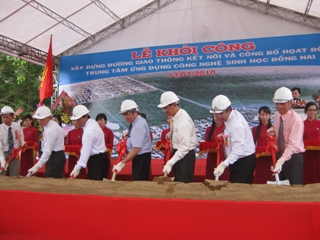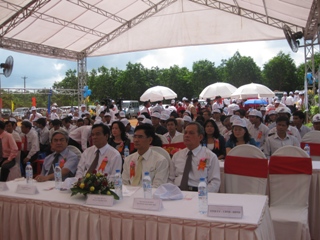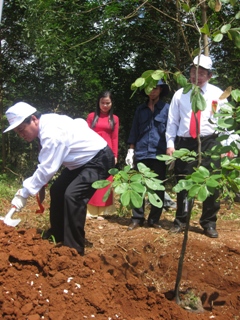HTML clipboard
 |
|
Officials present at the groundbreaking ceremony |
The ceremony was attended by the comrades: Mr. Nguyen Quan - Vice Minister of Ministry of Science and Technology; Mr. Tran Dinh Thanh - Member of the Central Party Committee, Secretary of Dong Nai Party Committee and Chairman of Dong Nai People’s Council; Mr. Tran Van Vinh – Member of Dong Nai Party Committee, Vice Chairman of Dong Nai People’s Committee and Head of the DCAB project; the representative leaders from other provinces; regional scientists and the representative leaders from all the districts in the province.DCAB will be
built on an area of 207.8 hectares in Xuan Duong commune, Cam My district.
The
site on which DCAB is situated is a central point where major roads meet
according to the development strategy of the southern key economic region.
This
site is also within the radius of explicit influence from Ho Chi Minh city to its
adjacent areas.
DCAB is the
first step for the building of a hi-tech biotechonology park.
DCAB is required
to satisfy the nucleus function of a hi-tech biotechonology park and of a
scientific town in the future.
DCAB is a place to conduct research into and
apply advanced biotechnology to agriculture, food, health and environment.
DCAB
will be developed on a basis of mobilizing scientific resources at home and
abroad.
 |
|
Guests
invited to the ceremony |
DCAB is
established according to an open policy under which a range of resources from
inside and outside the province are attracted and used appropriately and in
which the rights and responsibilities of the parties go together.
The DCAB
project is broken down into two phases:
Phase 1
(2010-2015): complete the initial infrastructure: transport systems,
communications, electrical systems, administrative buildings and wards for
biotech product research, application and manufacturing; apply biotech to
creating crop plants and raising domestic animals; apply advanced biotech
achievements to protecting environment and fighting environmental pollution;
focus on human resource training and attraction.
 |
|
Mr.
Tran Dinh Thanh is addressing the ceremony |
Phase 2
(2015-2020): complete the building of all functional wards meeting the standards
of a hitech biotechnology park; widely apply biotech to agriculture, food,
medicine and environment; cooperate with domestic and foreign organizations in
increasing the proportion of research and implementation activities to satisfy
research and technology transfer needs in the region.
 |
|
Mr.
Tran Dinh Thanh is planting a memorial tree at DCA |
Up to now,
DCAB has organized a core human resource team including four masters and more
than twenty others who are following postgraduate programmes.
DCAB also
completed site clearance work and compensation payment.
Many DCAB sub-projects have
been carried out and are calling for investment. Particularly, all the
procedures for the building of six-kilometer link roads into DCAB including
internal roads of two kilometers were finished.
That these roads are made is a
prerequisite for the construction of the essential infrastructure for the start
of the establishment of an biotech application model in agriculture and for
calling for investment into the biotech industry.
Attending and
addressing the ceremony, Secretary of Dong Nai Party Committee, Tran Dinh Thanh,
commended the DCAB Construction Board for its efforts and prudent management.
“DCAB is a large project. It is a rather new model in the world in need of
professional and technical skills and technology. DCAB project requires the
estimates and assessment by ministries and central and local sectors”, Thanh
emphasized.
“Departments, committees, sectors and local
governments need a collaboration to help increase the effectiveness of the
project, to call for investment, to seek for sources of sponsorship as well as
the professional assistance from the Ministry of Science and Technology and the
institutions inside and outside the province, to pay a special attention to
environmental protection and life, to attract the participation of local
laborers in the project and to strive to reach an advanced level of biotech
application in the Southeast Asian region in 2020," continued he.
Reported by Lien Huong,
Translated by Duy Minh